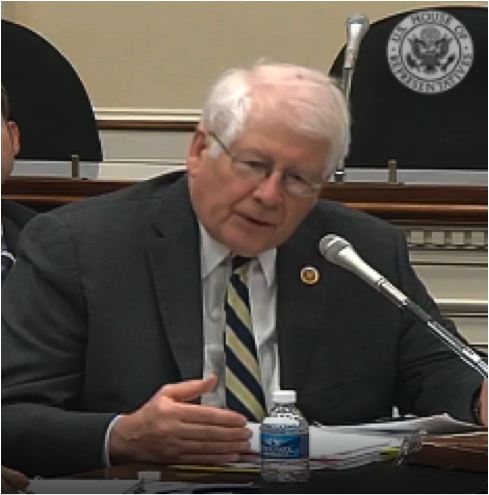Constrained by Paul Ryan's budget and the sequester, the House Appropriations Subcommittee on Transportation and HUD passed a $44 billion spending bill for 2014 – 15 percent lower than 2013 enacted levels. The bill contains $15.3 billion in discretionary appropriations for the Department of Transportation, also 15 percent below enacted 2013 levels and amounting to about two-thirds of the president’s request. It passed the subcommitee this morning on a voice vote.
The budget would eliminate both TIGER and high-speed rail funding (as have all House-passed budgets in recent memory), cut Amtrak’s subsidy by a third, and bring HUD’s Community Development Block Grants back to Ford administration levels. While the cuts are steep, as in past years they are unlikely to be enacted, given Democratic control of the Senate.
At today's markup, even subcommittee chair Tom Latham (R-IA) admitted that cutting $7.7 billion was “extremely challenging” and “not an easy task.” No other Republican spoke at all. While Latham’s official statement upon the introduction of the bill said that it was crafted “in a bipartisan fashion,” he admitted during the markup that he could thank Ranking Member Ed Pastor only for good “communication” rather than “cooperation” on the bill, since the top committee Democrat wasn’t “a huge fan of the product.”
Across the board, Democrats disavowed the bill and the process that begat it. While many acknowledged that Latham had received “an impossible allocation” from Rep. Paul Ryan’s Budget Committee, Democrats made it clear that the 15 percent cut was “unacceptable.” The appropriation is $4.4 billion lower than the amount allowed by the sequester.
Nita Lowey, ranking member of the full Appropriations Committee, said this budget “impairs the economic recovery," and Illinois Democrat Mike Quigley said the bill “defies financial common sense," not to mention the committee's "moral obligations” to preserve the social safety net. David Price of North Carolina said it was “a grossly inadequate bill” that goes “way beyond the normal range of disagreements and difficulties with appropriations.” He mused that it could be “the twilight of the appropriations process.”
“I’ve never known us to be in this kind of institutional crisis,” Price said. “Are we totally helpless here? I know that’s what we hear, that we’re boxed in by sequestration, that we’re boxed in by the absence of a budget agreement.”
Price suggested the need for leadership “perhaps outside the conventional channels,” implying that they, the appropriators -- who understand better than anyone the damaging cuts that are necessitated by such an austere budget -- need to take the reins back from the deficit hawks in the Budget Committee.
Highway and transit programs maintain their MAP-21-authorized levels of $41 billion and $8.6 billion, respectively, in the appropriations bill. That represents a $557 million increase for highways over this year. These programs come out of the Highway Trust Fund and so aren’t included in the appropriations bill's top-line numbers.
Not only would TIGER funding be eliminated for 2014, but $237 million in unobligated FY 2013 TIGER funding is also rescinded in the bill. However, Larry Ehl at Transportation Issues Daily speculates that the rescission won’t survive and that the current round of TIGER will eventually get its full allocation. “It will be tougher to preserve the 2014 TIGER funding,” he says, “but ultimately we think it will survive. TIGER is a competitive grant program that is massively popular among state DOTs and local governments – including those in ‘red’ states.”
The FTA itself, meanwhile, would take a $329.7 million hit it can scarcely afford. The agency is already underfunded and understaffed. New Starts, the capital investment program for transit, would get a 2 percent cut, and Small Starts would stay intact.
The Federal Railroad Administration would take a whopping 40 percent cut under the House appropriations bill. Rail safety programs, however, would be fully funded. Highway and motorcoach safety overseers, NHTSA and FMCSA, both stand to get a small increase.
In cutting 15 percent from the HUD budget – $3 billion more than the cuts ordered by sequestration – the committee notes that “the bill does not contain funding for any new, unauthorized ‘sustainable,’ ‘livable,’ or ‘green’ community development programs” like the Partnership for Sustainable Communities, which the House never votes to fund. Community Planning and Development programs under HUD would get a $1.9 billion cut – about one-third less than 2013.
President Obama's $50 billion infrastructure investment proposal is, of course, absent from the bill. His budget also moves Amtrak funding from the "discretionary" column to "mandatory," a move the House failed to replicate.
The full Appropriations Committee will vote on this budget a week from tomorrow. The House's austerity package will meet with firm opposition in the Democratic-controlled Senate, which will likely pass something along the lines of President Obama's budget proposal -- more than twice what the House is willing to spend -- leading to another budget stalemate and, likely, yet another continuing resolution that just maintains current spending levels for next year.
Although the Ryan budget and the sequester have extracted a pound of flesh from programs across the government, transportation has its own unique trauma to deal with -- the insolvency of the Highway Trust Fund. Though not all of the items above are funded out of the HTF, it's safe to say that no transportation appropriations process will go smoothly until the basic highway and transit programs are on more stable footing. And as of yet, the obvious and easy solution of raising the gas tax is still a political hot potato that few in Congress or the administration are willing to support.






